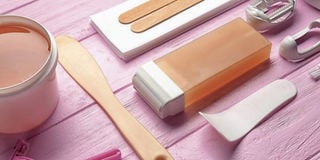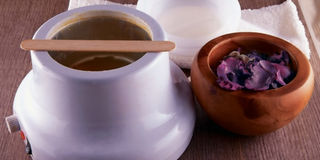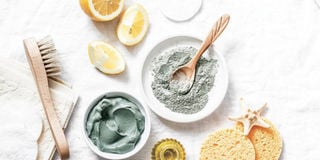Vaginal cleansing trends: Experts urge caution

What you need to know:
- Dr Sule tells HealthyNation the products have no regulation
- She also points out the danger of using Yoni eggs, saying some women forget to remove them
- Dr Bosire says there is a risk of irritation and inflammation with vajacials
- Dr Bosire and Dr Ong’ech agree that the vagina naturally self-cleanses
It is 2.30pm when Nerima Wanyama walks into a beauty parlour in Nairobi’s CBD.
The 33-year-old comes here from time to time for her usual skin care routine. “My confidence goes to another level after my routine. It is very refreshing and makes me so happy,” she tells HealthyNation.
The beauty parlour is a bee-hive of activity as men and women are attended to.
Ms Wanyama is here for a vajacial, a procedure that has caught on among Kenyan women, going by the buzz on social media. A vajacial is just like a facial (for the face), but done on the vagina.
Her waxologist, Ms Amaryllis Muthoni, ushers her into a private room for the procedure. Ms Wanyama’s one-hour session will see her part with Sh4,500.
“In Kenya, waxing and vajacials became popular in 2017. But, before then the concept was very alien to most Kenyans,” Ms Muthoni explains.
What does it entail? “It takes about eight steps including waxing, cleansing, scrubbing, massaging, steaming, extraction of ingrown hair, masking and massaging again. In between all the steps, the attendant has to tone using rose water to remove any lingering dirt,” she explains.
For centuries, women have explored uncharted waters when it comes to their bodies and a vajacial is just one of the many procedures they have warmed up to, for “hygiene”.
Women have also taken up things like douching, unregulated sanitary towels, washing with perfumed products and Yoni eggs.
Experts are now warning that these trends could be doing more harm than good and are likely to cause serious health implications.
But Ms Muthoni, who has a diploma in Beauty Therapy and has specialised in waxology, swears by her products. She says she is keen to use organic and homemade products such as sugar, lemon and water in all her procedures, “which are safe”.
She admits that when vajacials are done the wrong way, they could harm one’s private parts.
“When dealing with women’s bodies, any irritation will introduce bacteria to their private parts and will put them at risk of conditions that affect their skin such as folliculitis,” she says.
Folliculitis is a skin infection that can result from damage of hair follicles.
A study by the American Academy of Dermatology says folliculitis that comes about after waxing occurs most often on the arms or any other part of the body. Once the skin is damaged, it is easy for germs to get into the follicles and cause an infection.
Ms Muthoni also says ingrown hairs are a common side effect of almost all hair removal processes such as waxing.
“Ingrown hairs are usually tiny hairs that are not entirely removed and which coil back into the skin and continue to grow, causing tiny bumps that look like pimples,” she explains. “Infections may arise due to ingrown hair.”
Although rare, bruising and bleeding can also result from procedures such as vajacials and waxing. If not handled with caution, waxing can also cause trauma to the skin, she adds.
Dr Nelly Bosire, an obstetrician gynaecologist, says because vajacials involve scrubbing and steaming of the skin, there is a risk of irritation and inflammation. She warns that it is even riskier for people with eczema and psoriasis.
“Naturally, the vulval skin is full of hair follicles and oil glands. Exposure to scrubbing and the products used may worsen these conditions. Steaming may also result in accidental burns in very sensitive areas,” says Dr Bosire.
Yoni products
Other women have been bitten by the Yoni egg bug.
A Yoni egg, also known as Yoni pearl or jade egg, is a small egg-shaped ‘rock’ and is made from jade and quartz minerals.
Women insert the egg into their private parts to allegedly strengthen their pelvic floor muscles and for other reproductive health problems.
Gloria Otieno (not her real name) says she bought Yoni eggs after a friend recommended them for “cramps and detoxification”.
“I have not used them yet, but my friends told me they help ease period pains,” says the 25-year-old. “People also shared positive experiences on Instagram and I thought it would help me because I have very intense menstrual cramps.”
The internet is full of claims that Yoni eggs help women with infertility to conceive.

Waxing products
On May 27, a Twitter post originally posted on TikTok by consultant obstetrician gynaecologist Dr Kristina Sule on Yoni eggs warned users against the products.
Dr Sule says: “Some of you are not going to like this talk, but Yoni products are not FDA (Food Drug and Administration) approved. The manufacturers do not have any requirement to state what the constituents are. They cause infections.”
She adds: “Also, they do not treat infertility, they do not treat fibroids, they do not treat recurrent discharge. You need an obstetrician gynaecologist for that. Studies have not been done on Yoni products. What if they cause cancer in 10 years? They promise to cleanse your vagina and womb, which are self-cleansing. Ladies, you do not need anything Yoni, trust me.”
University student Marion Rono, 19, says a friend recommended some of the products to stop itching in her private parts. “I always feel itchy after shaving, but after buying a soap from a shop in town, the itching has reduced,” she claims.
Rono bought wipes, soap, a vaginal wash and some oil as a package for about Sh2,000. “I use the products daily except when I am on my periods,” she says. “I try not to insert anything inside as the instructions on the soap say.”
A shop in Nairobi’s CBD that sells Yoni products says they “are organic”.
“For girls who have intense cramps, we have sanitary towels which are very organic and have a negative ion (anion) to keep away infections during your periods and ease the pain,” an attendant tells HealthyNation.
However, some sanitary towels being sold at the shop do not have a quality assurance mark from Kenya Bureau of Standards (Kebs).
Asked about the quality of these products, an official at the Kebs says it would take some time to confirm their authenticity.
“It will take us quite some time before we can follow up on these products to establish if they are safe and then get back to you,” says the official, who sought anonymity as they are not authorised to speak to the press.
Dr Sule tells HealthyNation the products have no regulation, verification and have caused a lot of problems to women in terms of pain, vaginal dryness and infections.
“Patients who come to me after using Yoni products get a lot of infections,” she explains.
She also points out the danger of using Yoni eggs, saying some women forget to remove them. “People who sell such products lure many women into buying them by saying things like the pearls will help deal with infertility, fibroids, abnormal periods and pelvic pain,” she says.
“When a drug is being developed, it has to go through a rigorous process which may take up to 12 years before approval. But there were no trials recorded anywhere for those pearls. If they harm the user, the seller is not liable,” she explains.
Dr Sule adds that for one to claim they got pregnant as a result of using the Yoni pearls, a study will have to be done to prove the conception indeed happened because of the product.
What are the contents of a Yoni pearl?
“Those who broke it open found things like silica gel,” she tells HealthyNation. “Silica gel is a drying agent that manufacturers often place in little packets to keep moisture from damaging certain commercial products like handbags. That is why they cause dryness.”

Products used to make a mask
The dryness is a result of a hormonal imbalance and needs medical attention, says the expert. “If one has infertility issues they need to see a fertility specialist, who will tell them, for instance, that the fallopian tubes are blocked. This means you may need in vitro fertilisation,” she says.
The expert refutes claims that women turn to these products because they cannot afford treatment. “A lady told me they use Yoni products out of desperation because they do not have enough money to see a gynaecologist. Some of those products cost as much as Sh15,000 yet one only needs Sh800 or less to see a gynaecologist at a government facility,” says Dr Sule.
However, she says under specific circumstances gynaecologists can recommend what she calls a medicated pessary (a soft removable device that goes into the vagina and supports areas that are affected by pelvic organ prolapse.
This happens when the bladder, rectum or uterus drops or bulges down).
Dr John Ong’ech, an obstetrician-gynaecologist, recommends Kegel exercises to strengthen pelvic floor muscles, not Yoni eggs.
“You do not have to insert anything,” he says, supporting Dr Sule’s sentiments who recommends at least 3,000 Kegels a day.
On the use of sanitary towels that have a negative ion, Dr Ong’ech says they have no scientific backing. “Any treatment that is not scientifically backed and which introduces foreign bodies can cause inflammation. It may even be cancerous,” he says.
“When we are studying causes of chemical irritations or inflammations, in the long term, we find they are likely to leave scarred vaginal tissue. This scarring could cause health complications in the future,” he adds.
Dr Bosire says by nature, the vagina is not a sterile environment. It is full of good bacteria, opportunistic bacteria and yeast. “These organisms coexist in this space by creating a fine balance. The good bacteria extract sugar from the vaginal wall cells and ferment it to produce acid. This lowers the PH, creating an environment that does not permit the yeast and the opportunistic bacteria to thrive,” she explains.
According to her, anything that upsets this balance results in an overgrowth of the yeast and bacteria, resulting in an abnormal discharge. “By using Yoni pearls, one introduces a foreign body. The presence of a foreign body creates an environment where bacteria can attach and multiply excessively,” she says.
“The longer it stays inside, the more the bacteria multiply, resulting in a mass of opportunistic overgrown bacteria. So one does not really cleanse but trigger harmful bacteria.”

Dr Sule says the uterus, ovaries, fallopian tubes and vagina do not require detoxification.
She says these procedures are new and not enough evidence has been collected to say much about their long-term effects.
Dr Ong’ech warns against these trends, save for waxing.
“Waxing is okay since it is only taking care of the hair around the area,” he says. “Anything beyond that such as steaming is not recommended.”
Steaming has no scientific basis and the very high temperatures might interfere with the vaginal cells and how they replenish themselves, says Dr Ong’ech.
Douching craze
Another worrying trend women in the country are adopting is douching. “Douching is basically when you insert a liquid of some sort inside the vagina, either a medicated liquid or another product,” says Dr Sule.
“Some women use Betadine solution which is an antiseptic, Yoni products or Coca Cola beverages, which are very harmful.”
She warns against these and the use of garlic or yoghurt for yeast infections.
“It is an absolute no. But, it is very healthy to drink yoghurt to allow lactobacilli (a type of bacteria that lives in the genital system without causing disease) to restore PH balance and clear infections,” she says.
According to researchers in the department of epidemiology and biostatistics, school of public health at the University of Zambia, douching with vinegar, ginger, lemon, and salt or sugar solution is associated with the increased risk of abnormal cervical lesions.
A precancerous cervical lesion, which is also called an intraepithelial lesion, is an abnormality in the cells of a woman’s cervix that could eventually develop into cervical cancer.
A study in the Jama Networks journal also highlights that douching is more harmful than it is beneficial. “Studies showing adverse effects of improper douching were published as early as the 1940s. By the early 1990s, numerous studies had found correlations between douching and adverse gynaecologic effects,” says the study.
The cleansing debate
Dr Sule says the uterus, ovaries, fallopian tubes and vagina do not require detoxification.
“Certain organs like the liver, due to high alcohol intake or sometimes the kidney, may require detoxification. But not the vagina as it is self-cleansing. Such diction is used as a way of making women feel dirty by merchants peddling harmful products,” she cautions.
Dr Bosire and Dr Ong’ech agree that the vagina naturally self-cleanses and maintains its PH and normal bacteria.
“If one inserts anything, it will affect the PH and flora, resulting in chemical irritation and inflammation. This unhealthy balance can also result in other effects such as painful intercourse,” explains Dr Ong’ech.
He also advises that in case one has infections, they should see a gynaecologist instead of buying over-the-counter products. “Once the gynaecologist checks and confirms everything is fine you do not have to introduce anything else. If something is wrong, the gynaecologist will pick it up and treat it accordingly,” he says.
He recommends regular check-ups.




